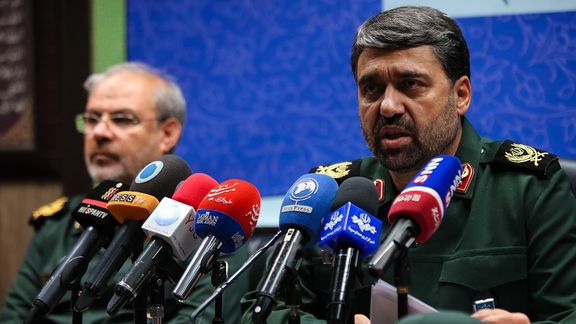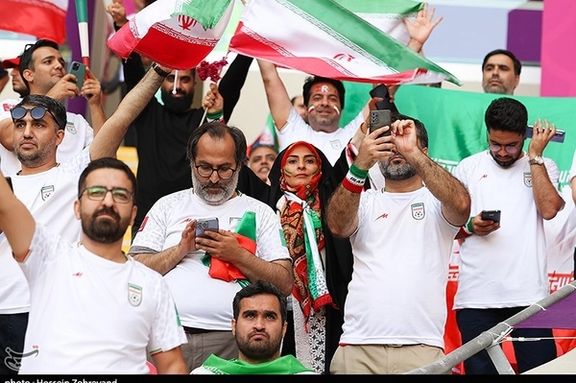IRGC Man Says Qatar Helping Iran Silence Dissidents In World Cup

Documents obtained by Iran International show Iran was coordinating secret efforts with Qatar to control who attends the World Cup and restrict any signs of dissent.

Documents obtained by Iran International show Iran was coordinating secret efforts with Qatar to control who attends the World Cup and restrict any signs of dissent.
Black Reward, a hactivist group that found access to Fars News Agency files this week provided an audio tape of a meeting between a Revolutionary Guard general and a group of media managers or representatives from outfits affiliated with the IRGC about plans to use the sporting event to the benefit of the regime in Tehran.
A six-minute audio segment of a tape features General Ghasem Ghoreyshi (Qasem Qoreyshi), deputy commander of the paramilitary Basij and a group of reporters including the one from Fars News who met with him possible in the presence of other trusted reporters to discuss the latest developments including plans for the World Cup.
The meeting took place on Tuesday 15th of November.
Ghoreyshi starts by saying that “anti-revolutionaries” have bought “5,330 tickets” to the tournament and adds that “our boys have checked the list of the ticket holders and at least 500 people” are known opponents of the Iranian regime.
This is the first piece of evidence of collaboration with Qatar, showing that Iran obtained the list of ticket buyers most probably from Qatari authorities.
The Fars representative then asks the General if it is true that Iran’s intelligence ministry had asked Qatar to cancel these tickets. Ghoreyshi says that “Qatar has two different conducts with us – one is a positive response, and it has promised to do that [cancel tickets], but usually they don’t fully deliver. They told us give us the names [of unwanted people], and we will solve the issue.”

Ghoreyshi goes on to say that Qatar also sometimes does not cooperate. At this point he mentions the example of Iran International, saying Qatar asked Iran to provide documents if it wanted the television network to be banned from the World Cup. He then complains that the host country has not still done so. The reporter interrupts telling the General that just the day before, Iran International announced that its reporters have been denied permission to cover the games. Ghoreyshi, who was apparently not aware, shows his surprise and says that Iran discussed the issue with Qatar “the day before”.
In mid-November Iran International announced that Qatar revoked permission for its reporters and TV crew to travel to the country and cover the World Cup. The denial of permission after initial agreement came without an explanation.
Ghoreyshi admits that Iran provided Qatar with “films” related to protests, as documents needed to ban Iran International. These presumably were user-generated videos from the protests that Iran International aired, as did other foreign-based Persian broadcasters.
He goes on to say that Qatar has even promised to control spectators inside the stadiums, not allowing Iranian flags other than the Islamic Republic flag to be displayed.
This is exactly what happened once the games started. During Iran’s second match against Wales on November 25, Iranian fans, who wanted to take flags other than the official one approved by the Islamic Republic to the Al Rayyan’s Ahmad bin Ali Stadium, were stopped by security officers. Many people were barred from carrying or waving Iran’s ancient flag with the Lion and Sun emblem or a simple three-color flag with the main motto of the current wave of protests – Woman, Life, Liberty. Some were even detained for hours by Qatari police.
All this was because of the regime’s concern over dissident Iranians manifesting antigovernment signs and actions that people back in Iran could see on television. Nevertheless, many did chant and boo when the Islamic Republic anthem was played in the stadiums.
This fits into the rest of the conversation in the tape obtained by hackers. The conversation between the IRGC general and reporter(s) reveals an elaborate plan by the Islamic Republic to use the World Cup event in Qatar to win political points amid popular protests.
Ghoreyshi then explains that the government is paying the expenses of its supporters to go to Qatar to attend Iran’s games and show that the Islamic Republic enjoys support.
In fact, images from the stadiums show hundreds of government officials, influential people from the regime’s inner circle, including journalists working for hardliner media in attendance.